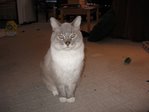 Okay, fate may have simply intervened here. I opened the Dean Acheson topic in my initial post, referring to his memoir Present at the Creation. Since I clearly wish to accentuate Books and Bait on this blog, why not briefly continue with the Acheson subject? I hope my readers are familiar with him.
Okay, fate may have simply intervened here. I opened the Dean Acheson topic in my initial post, referring to his memoir Present at the Creation. Since I clearly wish to accentuate Books and Bait on this blog, why not briefly continue with the Acheson subject? I hope my readers are familiar with him.A new biography has recently been published on Acheson. Dean Acheson: A Life in the Cold War was released this past October to very positive reviews. The author, Robert L. Beisner is a prominent diplomatic historian who has written several other seminal books in that field. Personally, I think Beisner's From the Old Diplomacy to the New, 1865-1900 is one of the best diplomatic history synthesis' of that critical era of American expansionism. I have used it in class numerous times. Beisner is also a polished writer and experienced researcher. I am looking forward to reading this particular work on Acheson.
There are several reviews that you should examine if you are considering purchasing this 800 page volume. First, Henry Kissinger's review in the New York Times. We all know that Dr. Kissinger probably believes he was the greatest Secretary of State in American history--which makes it all the more interesting to read his comments about a man that might have actually been the greatest Secretary of State. There is also an engaging review by Robert Kagan where he gives Acheson considerable credit for winning the Cold War.
I have several other books on my reading docket at this time, but I will be buying this book in a few months. I have just started James Carroll's House of War, which is a history of the Pentagon and the rise of American military power. I will be reading more both Acheson and Kissinger in that book.
I promise not to write anything else about Dean Acheson--sort of. Maybe a examination of books about other American Secretaries of State would be in order. I'll work on that. I know you are all itching to locate books about Abel Upshur and Hamilton Fish.
I have several other books on my reading docket at this time, but I will be buying this book in a few months. I have just started James Carroll's House of War, which is a history of the Pentagon and the rise of American military power. I will be reading more both Acheson and Kissinger in that book.
I promise not to write anything else about Dean Acheson--sort of. Maybe a examination of books about other American Secretaries of State would be in order. I'll work on that. I know you are all itching to locate books about Abel Upshur and Hamilton Fish.





1 comment:
Found this looking into film Good Shepherd
Richard Bissell, Tracy Barnes, who along with the lesser known Richard Drain, planned the Bay of Pigs.
the Bundy Brothers, behind Vietnam.
Edgar Applewhite, Beirut station chief at the time of Philby's defection to Russia, and later a follower of Buckminster Fuller.
James Jesus Angleton was born in Idaho, of a father who had recently fought Pancho Villa's men, where he first met Bill Donovan. Went on to run NCR's operations in Italy as well as the Chamber of Commerce there. He was educated in England, was steeped in Italian culture,which led to his interest in poetry, where he edited the Yale literary magazine, served in the O.S.S., in Italy, stayed in the post war era, arranging the defeat of the communists, through "election funding". Played a not insignificant role as liason to the Israeli Mossad, thorough to the 1970s.
Then shifted to counter intelligence, mail intercept programs
The "Trust"disinformation program against Russian emigre groups in early Leninist Russia triggered his paranoia. Which was furthered by the likes of Anatoly Golitsin.There was indeed a penetration regarding the Bay of Pigs, which was essentially a larger version of the Jedburgh landings during WW 2, and the operations against Albania, Southern Russia. The leak came from dock workers loading the invasion fleet in Guatemala, not a deep cover mole as suggested in Robert Littell's The Company. That magnum opus, suggests Angleton was paranoid
Another earlier work, Aaron Latham (writer of Urban Cowboy and Leslie Stahl's husband) "Orchids for Mother" actually paints him as a mentor, if not necessarily a hero, to a young Yale graduate protege, in Nixon era Washington, who arranges an enigmatic comeuppance for his long time rivals, in the Agency and Congress.
Not to mention Mailer's portrait of him as Harlot, in his tome, Harlot's Ghost, mentoringa Korean War era protege Harry Hubbard, who gives us a glimpse of 50s Berlin, the Uruguay where Howard Hunt made his bones, and the Miami JM/WAVE station.
Post a Comment